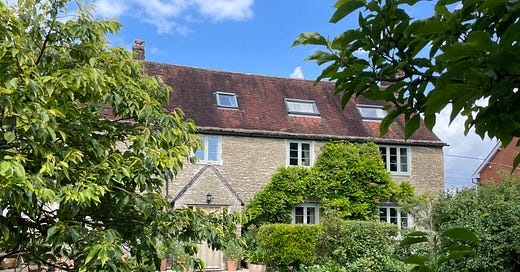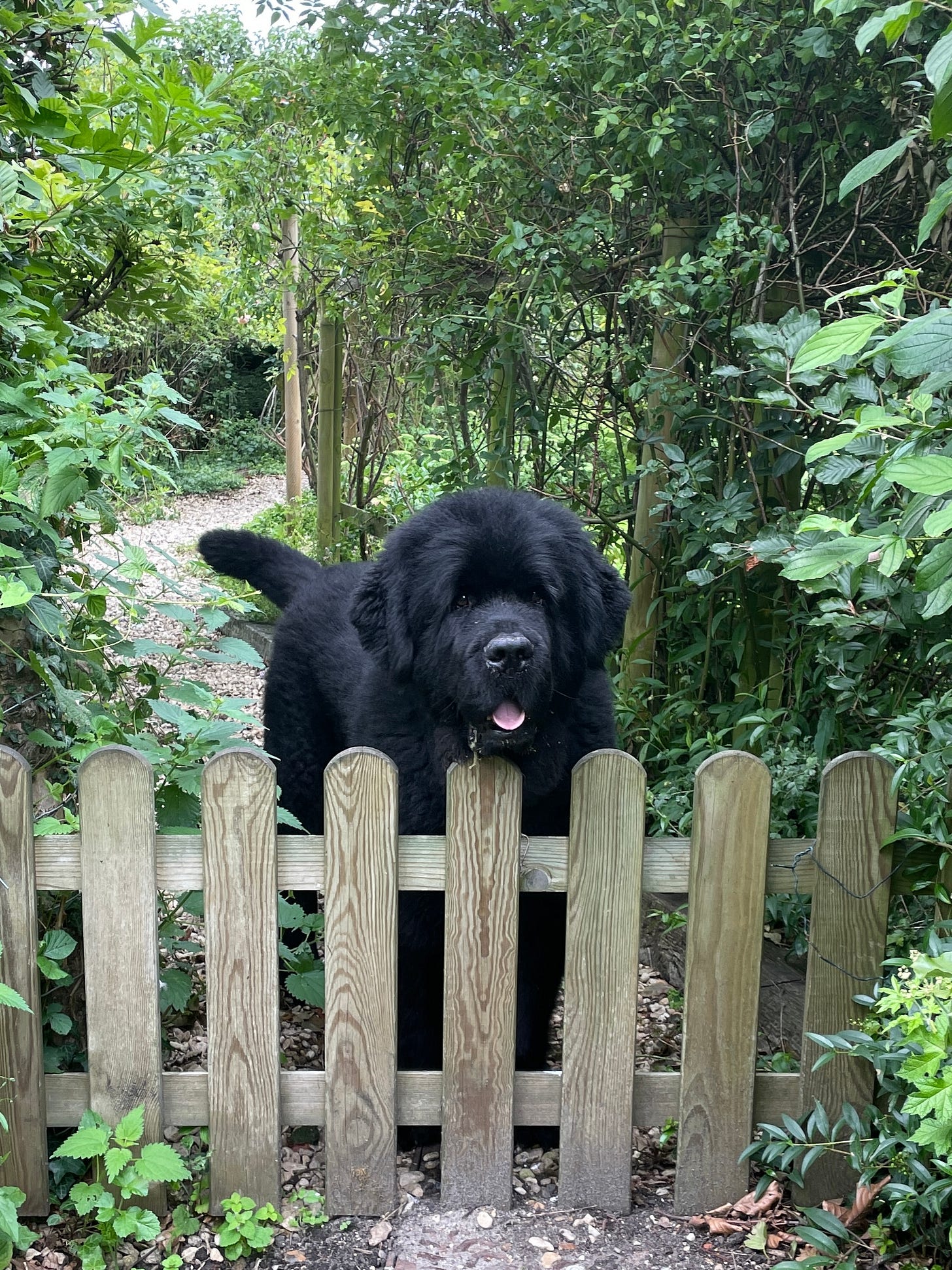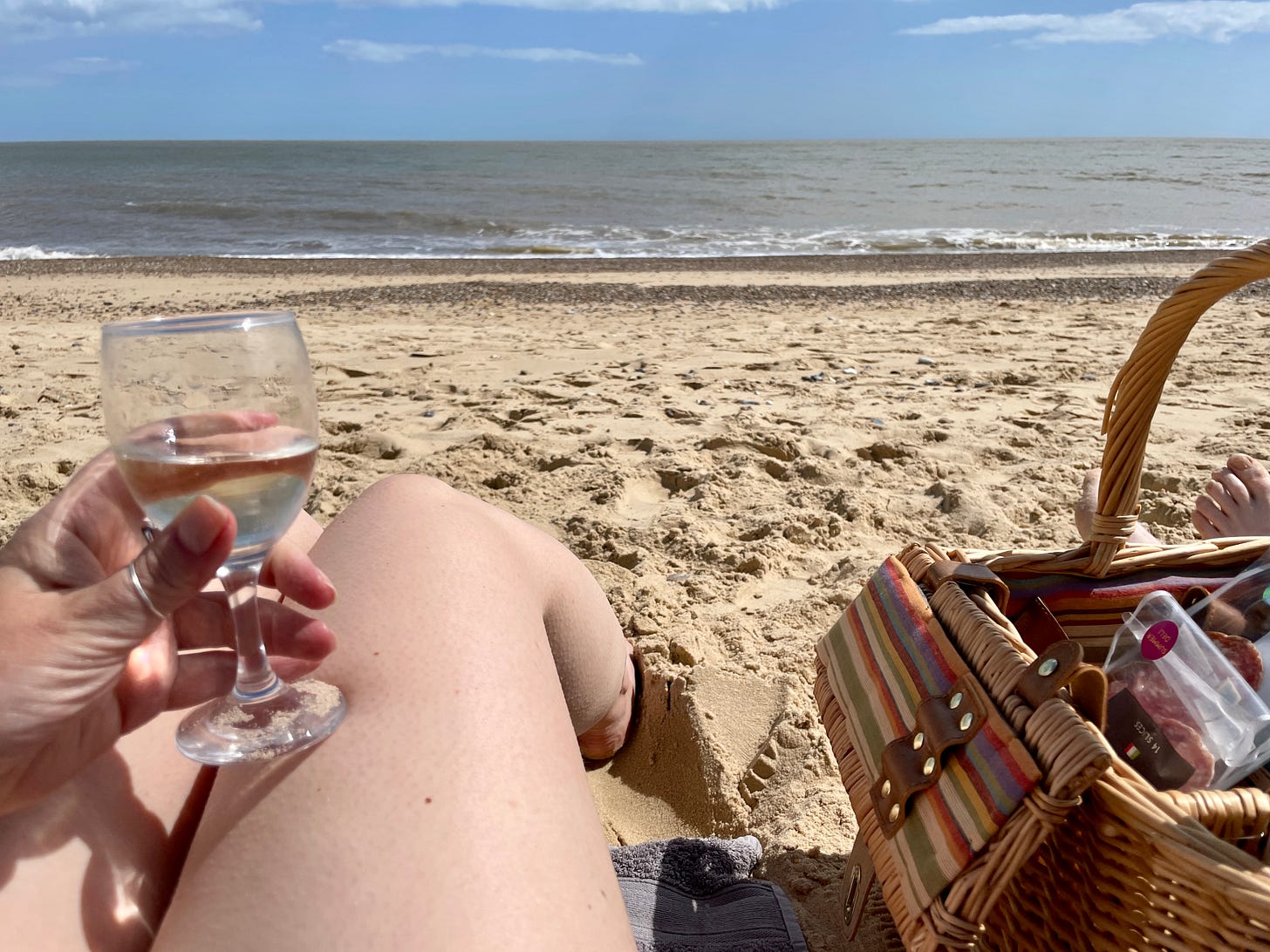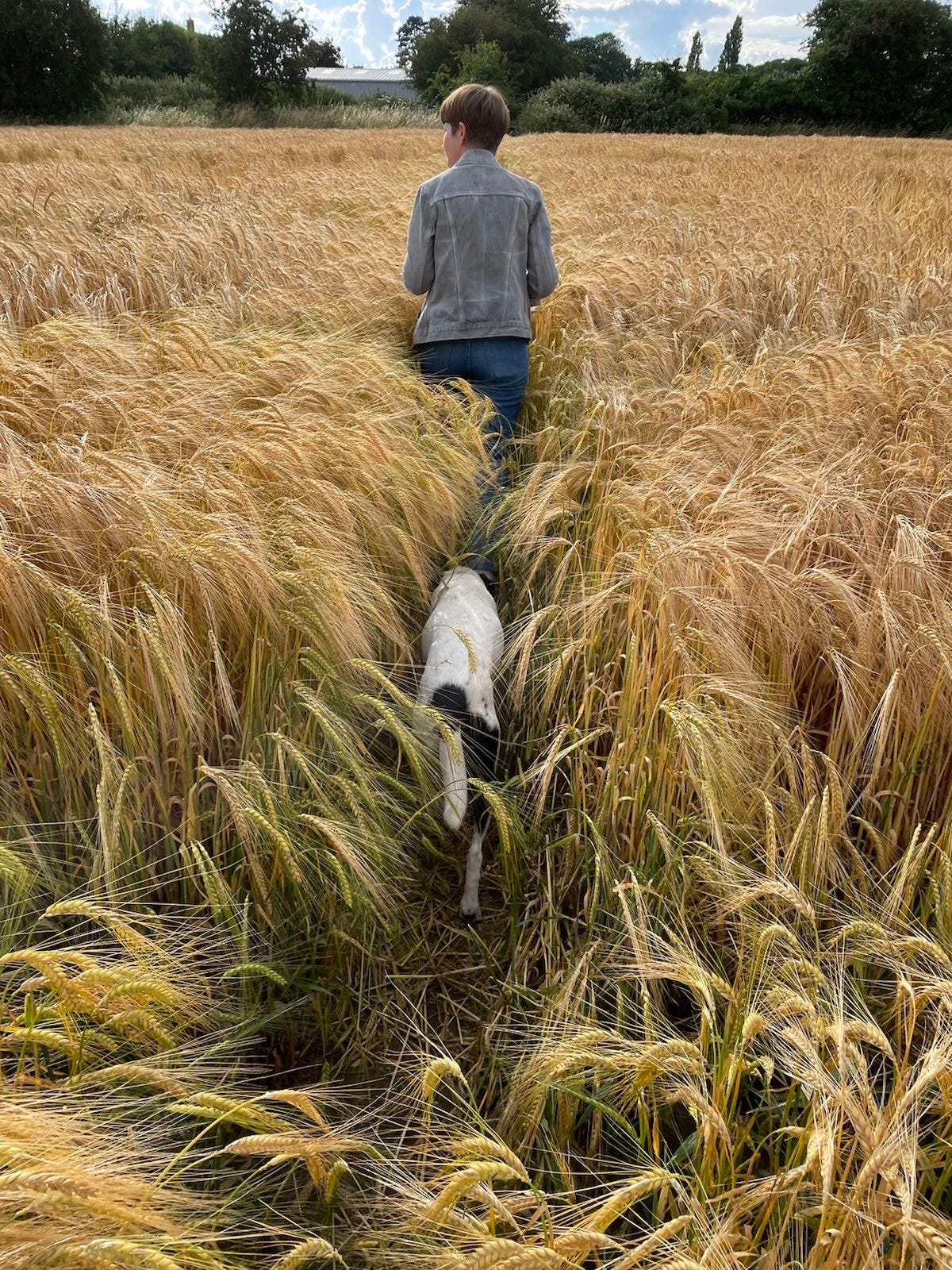Creaturely discomforts
Thoughts on balance, comfort, anxiety and creativity; and an attempt to answer the question, 'Where do you get your ideas?'
I am in a slope-walled, pyramid-shaped room at the very top of an old, stone house in Britain’s south-west. Here and there on its huge oak beams are taper marks burned deep into the wood by lit candles, thought to be a way of warding off misfortune or evil influence; I have similar marks on the bressummer beam above my fireplace at home in Suffolk. Once the village workhouse, then three cottages, this place now belongs to old friends of mine, one of whom I have known now for thirty years. We were friends at university: she came to both my weddings, and I to her only one (she proved better at marriage than I am). I’m godmother to their youngest daughter, for whom I have renounced Satan “and all his works, and all his pomps.” Pomps!
I’m here to look after the house and garden and my friends’ two dogs, a Labrador and a huge and very stubborn Newfoundland, and – as I discovered on arrival – a charismatic young tortoise, who I have rechristened Cora for the duration of my stay. I have house- and pet-sat here many times since they bought it in 2007, through various iterations of dogs, rescue chickens and other creatures. Apart from my first visit, when I came to help them clear the garden not long after they’d moved in, I’ve only ever experienced it at this time of year: I’ve never seen the magnolia in flower, or frost on the lawn. For me, it is always summer here.
The first time I came I was filled with a deep sense of recognition, the kind that can happen sometimes in dreams. On the surface it’s nothing like the slightly dilapidated house I grew up in – it’s older, smarter and much more beautiful, with its sandstone walls, wisteria, and peg-tiled roof – yet there are correspondences, some of which I can point to, others more obscure. We too – a family of six children – had a large garden with apple trees and a weeping willow, though ours didn’t have a river bounding its southern end. Our stairs also led up to a galleried landing, though we didn’t have the second, attic floor that this house has, with its pyramidal rooms. But like the home of my childhood memories, this house is very lived-in, with floorboards that bang and creak, doorknobs that turn the wrong way, exposed gripper strips for long-gone carpets, mismatched furniture, lamps with wonky shades, dusty bookcases, rough, faded bath towels and drawers overstuffed with hairclips and dried-out pens.
Each time I come there are new idiosyncrasies: the TV that only works if a certain light switch is in the on position, a cooker that has begun to intermittently buzz unless a completely unmarked button is pressed. The broadband is capable of dropping out several times an hour, or working perfectly. Defunct electronics litter the rooms, while few things that are supposed to have batteries in – such as the bins, for some reason – actually do.
At home in my own, highly organised life, these things would feel profoundly ‘wrong’ and anxiety-making. I couldn’t leave them unaddressed, even if I knew they were causing no harm.
On more than one occasion I’ve arrived to find there are new and previously unmentioned animals to look after: bees; chicks raised from eggs by my goddaughter’s class at school; tropical fish; this year, Cora the tortoise. Sometimes something is ill, and needs special care: a broody hen who had to be reminded daily to eat and drink, a dog with a gummy eye. During the chicken years there was a smorgasbord of dramas, including a very persistent fox, the year they learned to fly and wanted to roost in the trees, and the time the placid chocolate labrador, Radish (RIP) caught and suffocated one within half an hour of my friends leaving me in charge. I have never yet managed to keep up with the picking schedule for the vegetable garden, always ending my stay with a fridge full of courgettes, chard and kale. One year I took my eye off the ball and there were marrows absolutely everywhere. Another year the river threatened to burst its banks.
It is, every time I come, a period of gently unfolding chaos of the kind that should be absolutely antithetical to a worrier like me. And yet I keep going back.
I am a planner, a list-maker, worker to deadlines, a conscientious completer of tasks. I can struggle with things that are unpredictable or uncontrolled, and with last-minute changes of plan. My mind’s resting state is one in which I scan the future for potential disasters, so I can put measures in place to ward them off. This is so normal for me that I struggle even to call it anxiety, though I’ve come to understand in recent years where it comes from, what is being managed, and what it costs.
When I say that my childhood home was like this house while being utterly unlike it, what I mean is that this is a warm, loving family, rooted in humour and amiability, the children held by their parents’ attention and care in such a way that mistakes don’t cause anything to tremble or break. When I stay here it is almost like revisiting my childhood, but finding it profoundly and positively changed.
Don’t get me wrong, there is anxiety: it’s no small thing to be in sole charge of a valuable and very old building, not to mention several deeply beloved pets that don’t belong to me. But it’s also the kind of thing I’m really good at: I save the important phone numbers into my phone and set alarms for all the various garden- and animal-related tasks, taking into account their frequency and even the weather conditions. But when something has gone wrong – like the unfortunate chicken that first year – I’ve never felt blamed. ‘Oh, that was just wear and tear,’ my friend’s husband said with a grin when I brought it up the night before they flew. We were drinking wine and they hadn’t even packed yet, despite a looming 4am start. The contrast between their holiday preparations and mine – like a minor military operation, despite there only being one of me – couldn’t have been starker, but it also couldn’t have felt funnier just then.
I love the fact that in their family life (their professional lives are very different) they seem entirely to lack the tendency towards perfectionism that can – for example, during the Covid lockdowns – rigidly control my days. Back then, my little cottage became so tidy and perfectly organised it was airless, suffocating, unliveable. With so much ambient anxiety to manage, no visitors and no changes to my routine, nothing disrupted my need for everything to be just so. It looked like extreme competency. It felt like self-harm.
I think it’s common for a half-known, half-heard part of us to seek balance, either by permitting the expression of something we’re stifling or incorporating something we don’t possess. It’s an impulse that surfaces in many different ways, from the senior police officer who enjoys being powerless in his or her erotic life to the cliché ‘opposites attract’. It’s true that more than once I’ve been drawn to romantic partners who have brought something to my life that I haven’t been able to provide for myself – though what it was hasn’t always been apparent to me at the time, and hasn’t necessarily felt good.
Another example: I worked for many years at a London music magazine. It was loud, unpredictable, and compared to most workplaces, chaotic, without any of the organisational structures that ensure people’s safety (and in fact, some people did end up harmed by the lack of guard rails there). So many things about it irritated me beyond measure, but when the magazine folded and my days were spent almost entirely in the beautiful Suffolk countryside I came to realise that its sheer unpredictability had, at some level, been good for me. Like staying at my friends’ house, it had brought me into a kind of balance – albeit very much against my will. Perhaps, as I discovered during the pandemic, none of us should have everything exactly as we want it all the time.
News:
The lead story is that I’ve handed a book in! It hasn’t been announced yet so I can’t really say much about it, only that it’s non-fiction, it’s been (genuinely) a blast to write, while also being quite stressful as I was up against the clock, and that I’m really quite astonishingly proud of it. It’s aimed at people who are new to nature, it will be very beautiful to look at, and it’ll be out next year. Once I’d submitted it, I went to the beach (large nuclear power station not shown):
Now that’s done and dusted it’s back to the novel, which absolutely terrifies me (more on this below the fold).
Since we were last in touch I’ve reviewed Lost On Me by Veronica Raimo for The Guardian, a work of autofiction in translation from Italian. I found it very funny, but it didn’t quite come together for me.
For my Nature Notebook in The Times I wrote about being at my friends’ West Country house: specifically the swans and water voles on the river. I also wrote in the same piece about coming home to Suffolk, where the shingle banks at Sizewell beach were in bloom. The Times is paywalled, but if you are a member of your local library you’ll probably be able to access all sorts of newspapers and periodicals. Your librarian will know more.
For the New Statesman I contributed a Summer Reflection, ostensibly about my ageing dog Scout, but also about climate grief and denial. I’ll be going to Brighton to look after Scout at the end of August, and I can’t wait to see her. As they used a stock image of a different dog to illustrate the piece I’m including a photo of the two of us below. It’s much better, right?
It’s very nearly time for Green Man Festival (17-20 August) where I’ll be on stage with the gardening writer and psychotherapist Marchelle Farrell, whose book Uprooting: From the Caribbean to the Countryside is out now. If you’ll be there, please check the listings for the Talking Shop stage and come along to both our events if you can make it.
A little heads-up: I’ll be making two (!) exciting announcements during my Green Man event; afterwards I’ll send out a short extra newsletter, as well as posting about it on my socials (I’m @m_z_harrison on Twitter, Instagram and Threads)
In the last edition of Witness Marks I promised to try and answer the question I dread from readers more than any other: ‘Where do you get your ideas?’ It relates very closely to everything I’ve just been saying, and I think relates too to all kinds of creative practice. If you’re a paying supporter you can read my attempt to answer that question below the fold.
Thank you so much to every one of you who have subscribed to Witness Marks, in whatever form; it means such a lot to me. If you enjoyed reading it, please feel free to forward it on to friends, or share it on social media.
Keep reading with a 7-day free trial
Subscribe to Witness Marks by Melissa Harrison to keep reading this post and get 7 days of free access to the full post archives.








